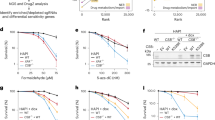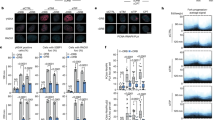Abstract
THE protein p21 (WAF1, CIP1 or sdil), induced by the tumour-suppressor protein p53, interacts with and inhibits two different targets essential for cell-cycle progression1–8. One of these is the cyclin–Cdk family of kinases and the other is the essential DNA replication factor, proliferating-cell nuclear antigen (PCNA). We report here that separate domains of p21 are responsible for interacting with and inhibiting the two targets. An amino-terminal domain inhibits cyclin–Cdk kinases and a carboxyl-terminal domain inhibits PCNA. Using these separated domains, we have determined that p21 inhibits different biological systems through different targets. The PCNA-binding domain is sufficient for inhibition of DNA replication based on simian virus 40, whereas the Cdk2-binding domain is sufficient for inhibition of DNA replication based on Xenopus egg extract and for growth suppression in transformed human cells.
This is a preview of subscription content, access via your institution
Access options
Subscribe to this journal
Receive 51 print issues and online access
$199.00 per year
only $3.90 per issue
Buy this article
- Purchase on Springer Link
- Instant access to full article PDF
Prices may be subject to local taxes which are calculated during checkout
Similar content being viewed by others
References
Xiong, Y. et al. Nature 366, 701–704 (1993).
Harper, J. W., Adami, G. R., Wei, N., Keyomarsi, K. & Elledge, S. J. Cell 75, 805–816 (1993).
el-Deiry, W. et al. Cell 75, 817–825 (1993).
Gu, Y., Turck, C. W. & Morgan, D. O. Nature 366, 707–710 (1993).
Noda, A., Ning, Y., Venable, S. F., Pereira, S. O. & Smith, J. R. Expl Cell Res. 211, 90–98 (1994).
el-Deiry, W. et al. Cancer Res. 54, 1169–1174 (1994).
Waga, S., Hannon, G. J., Beach, D. & Stillman, B. Nature 369, 574–578 (1994).
Flores-Rozas, H. et al. Proc. natn. Acad. Sci. U.S.A. 91, 8655–8659 (1994).
Strausfeld, U. P. et al. Curr. biol. 4, 876–883 (1994).
D'Urso, G., Marraccino, R. L., Marshak, D. R. & Roberts, J. M. Science 250, 786–791 (1990).
Dutta, A. & Stillman, B. EMBO J. 11, 2189–2199 (1922).
Li, R., Waga, S., Hannon, G. J., Beach, D. & Stillman, B. Nature 371, 534–537 (1994).
Dulic, V. et al. Cell 76, 1013–1023 (1994).
Polyak, K. et al. Cell 78, 59–66 (1994).
Toyoshima, H. & Hunter, T. Cell 78, 67–74 (1994).
Dutta, A., Ruppert, J. M., Aster, J. C. & Winchester, E. Nature 365, 79–82 (1993).
Author information
Authors and Affiliations
Rights and permissions
About this article
Cite this article
Chen, J., Jackson, P., Kirschner, M. et al. Separate domains of p21 involved in the inhibition of Cdk kinase and PCNA. Nature 374, 386–388 (1995). https://doi.org/10.1038/374386a0
Received:
Accepted:
Issue Date:
DOI: https://doi.org/10.1038/374386a0
This article is cited by
-
CMTM6 inhibits tumor growth and reverses chemoresistance by preventing ubiquitination of p21 in hepatocellular carcinoma
Cell Death & Disease (2022)
-
Clinical CDK4/6 inhibitors induce selective and immediate dissociation of p21 from cyclin D-CDK4 to inhibit CDK2
Nature Communications (2021)
-
Increased double strand breaks in diabetic β-cells with a p21 response that limits apoptosis
Scientific Reports (2019)
-
High speed of fork progression induces DNA replication stress and genomic instability
Nature (2018)
-
P21Waf1/Cip1 and p27Kip1 are correlated with the development and invasion of prolactinoma
Journal of Neuro-Oncology (2018)
Comments
By submitting a comment you agree to abide by our Terms and Community Guidelines. If you find something abusive or that does not comply with our terms or guidelines please flag it as inappropriate.



